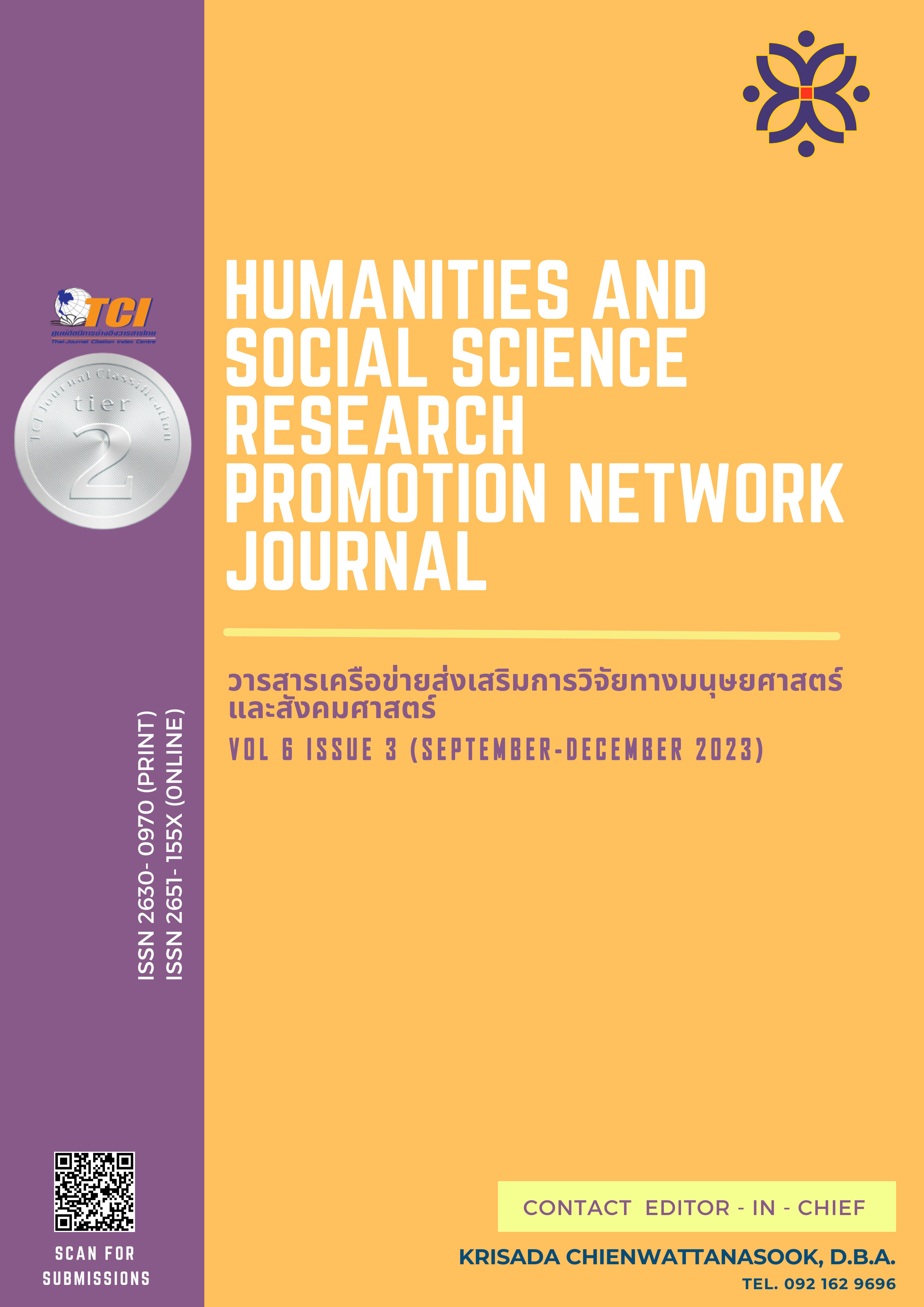อิทธิพลของการรับรู้การสนับสนุนจากองค์การต่อความผูกพันของพนักงาน ผ่านทุนทางจิตวิทยาเชิงบวก: กรณีศึกษาบริษัท ABC ในประเทศจีน
คำสำคัญ:
การรับรู้การสนับสนุนจากองค์การ , ความผูกพันของพนักงาน , ทุนทางจิตวิทยาเชิงบวกบทคัดย่อ
การวิจัยนี้มีวัตถุประสงค์เพื่อศึกษาการรับรู้การสนับสนุนจากองค์การที่มีอิทธิพลต่อความผูกพันของพนักงานบริษัท ABC ในประเทศจีน และเพื่อศึกษาอิทธิพลส่งผ่านของทุนทางจิตวิทยาเชิงบวกที่มีอิทธิพลระหว่างการรับรู้การสนับสนุนจากองค์การและความผูกพันของพนักงานบริษัท ABC ในประเทศจีน ประชากรที่ใช้ในการวิจัยนี้ คือ พนักงานบริษัท ABC ในประเทศจีน โดยใช้แบบสอบถามเก็บข้อมูลจากกลุ่มตัวอย่างจำนวน 220 คน ซึ่งใช้วิธีการสุ่มแบบไม่อาศัยความน่าจะเป็นแบบตามสะดวก วิเคราะห์ข้อมูลด้วยค่าความถี่ ร้อยละ ค่าเฉลี่ย และส่วนเบี่ยงเบนมาตรฐาน และทดสอบสมมติฐานด้วยแบบจำลองโครงสร้างกำลังสองน้อยที่สุดบางส่วน ผลการวิจัยพบว่าการรับรู้การสนับสนุนจากองค์การไม่ได้มีอิทธิพลโดยตรงต่อความผูกพันของพนักงานบริษัท อย่างไรก็ตามการรับรู้การสนับสนุนจากองค์การมีอิทธิพลทางอ้อมต่อความผูกพันของพนักงานบริษัทผ่านทุนทางจิตวิทยาเชิงบวกอย่างมีนัยสำคัญทางสถิติที่ระดับ .000 ซึ่งมีอำนาจในการพยากรณ์ร้อยละ 84.5 จึงยืนยันได้ว่าทุนทางจิตวิทยาเชิงบวกเป็นตัวแปรคั่นกลางอย่างเต็มรูปแบบ ดังนั้นผู้จัดการควรให้ความสำคัญกับความเป็นอยู่ที่ดีของพนักงานผ่านนโยบายต่าง ๆ เช่น ค่าตอบแทนและการฝึกอบรมที่แข่งขันได้ การปลูกฝังทุนทางจิตวิทยาเชิงบวกและแนวทางการจัดการที่สอดคล้องกับคุณค่าทางวัฒนธรรมจีนเป็นกุญแจสำคัญในการเลี้ยงดูพนักงานที่มีความผูกพัน
เอกสารอ้างอิง
Ahmed, I., Nawaz, M. M., Ali, G., & Islam, T. (2015). Perceived organizational support and its outcomes: A meta-analysis of latest available literature. Management Research Review, 38(6), 627-639.
Alvi, A. K., Abbasi, A. S., & Haider, R. (2014). Relationship of perceived organizational support and employee engagement. Science International, 26(2), 949-952.
Bridger, E. (2014). Employee Engagement. Kogan Page Publishers.
Eisenberger, N. I., Taylor, S. E., Gable, S. L., Hilmert, C. J., & Lieberman, M. D. (2007). Neural pathways link social support to attenuated neuroendocrine stress responses. Neuroimage, 35(4), 1601-1612.
Eisenberger, R., Armeli, S., Rexwinkel, B., Lynch, P. D., & Rhoades, L. (2001). Reciprocation of perceived organizational support. Journal of Applied Psychology, 86(1), 42.
Eisenberger, R., Huntington, R., Hutchison, S., & Sowa, D. (1986). Perceived organizational support. Journal of Applied Psychology, 71(3), 500-507.
Eisenberger, R., Karagonlar, G., Stinglhamber, F., Neves, P., Becker, T. E., & Gonzalez-Morales, M. G. (2010). Leader–member exchange, differentiation, and psychological contract fulfillment: A multilevel examination. Journal of Applied Psychology, 95(1), 108-121.
Eisenberger, R., Malone, G. P., & Presson, W. D. (2016). Optimizing perceived organizational support to enhance employee engagement. Society for Human Resource Management and Society for Industrial and Organizational Psychology, 2, 3-22.
Eisenberger, R., Stinglhamber, F., Vandenberghe, C., Sucharski, I. L., & Rhoades, L. (2002). Perceived supervisor support: Contributions to perceived organizational support and employee retention. Journal of Applied Psychology, 87(3), 565-573.
Gelens, J., Dries, N., Hofmans, J., & Pepermans, R. (2013). The role of perceived organizational justice in shaping the outcomes of talent management: A research agenda. Human Resource Management Review, 23(4), 341-353.
Gupta, N., & Sharma, V. (2016). Exploring employee engagement—A way to better business performance. Global Business Review, 17(3), 45S-63S.
Gupta, R., & Kankanhalli, A. (2018). Mediating role of positive psychological capital in the relationship between perceived organizational support and employee engagement. Journal of Workplace Behavioral Health, 33(2), 63-78.
Hair, J. F., Black, W. C., Babin, B. J., Anderson, R. E., & Tatham, R. L. (2010). Multivariate Data Analysis (7th ed.). Cengage Learning.
Henseler, J., Hubona, G., & Ray, P. A. (2016). Using PLS path modeling in new technology research: updated guidelines. Industrial Management & Data Systems, 116(1), 2-20.
Kim, J. S., Kim, Y. J., & Lee, J. Y. (2021). The relationship of perceived organizational support, positive psychological capital, and employee engagement among nurses. International Journal of Environmental Research and Public Health, 18(3), 1182.
Kline, R. B. (2023). Principles and practice of structural equation modeling. The Guilford Press.
Korzynski, P. (2015). Online networking and employee engagement: what current leaders do?. Journal of Managerial Psychology, 30(5), 582-596.
Lee, S. N., & Kim, J. A. (2017). Concept analysis of positive psychological capital. Journal of Korean Academy of Nursing Administration, 23(2), 181-190.
Li, Y., & Xu, Y. (2020). The indirect effect of perceived organizational support on employee engagement: The mediating role of positive psychological resources. Frontiers in Psychology, 11, 135.
Luthans, F., & Avolio, B. J. (2014). Brief summary of psychological capital and introduction to the special issue. Journal of Leadership & Organizational Studies, 21(2), 125-129.
Luthans, F., & Youssef-Morgan, C. M. (2017). Psychological capital: An evidence-based positive approach. Annual Review of Organizational Psychology and Organizational Behavior, 4, 339-366.
Luthans, F., Youssef, C. M., & Avolio, B. J. (2015). Psychological capital and beyond. Oxford University Press.
Mael, F., & Ashforth, B. E. (1992). Alumni and their alma mater: A partial test of the reformulated model of organizational identification. Journal of organizational Behavior, 13(2), 103-123.
Pandita, D., & Ray, S. (2018). Talent management and employee engagement–a meta-analysis of their impact on talent retention. Industrial and Commercial Training, 50(4), 185-199.
Rayton, B. A., & Yalabik, Z. Y. (2014). Work engagement, psychological contract breach and job satisfaction. The International Journal of Human Resource Management, 25(17), 2382-2400.
Rhoades, L., & Eisenberger, R. (2002). Perceived organizational support: a review of the literature. Journal of Applied Psychology, 87(4), 698-714.
Roemer, A., & Harris, C. (2018). Perceived organisational support and well-being: The role of psychological capital as a mediator. SA Journal of Industrial Psychology, 44(1), 1-11.
Ronkko, M., & Cho, E. (2020). An updated guideline for assessing discriminant validity. Organizational Research Methods, 25(1), 6-47.
Saks, A. M. (2019). Antecedents and consequences of employee engagement revisited. Journal of Organizational Effectiveness: People and Performance, 6(1), 19-38.
Sarwar, U., Aamir, M., Bichao, Y., & Chen, Z. (2023). Authentic leadership, perceived organizational support, and psychological capital: Implications for job performance in the education sector. Frontiers in Psychology, 13, 1084963.
Schaufeli, W. B., & Bakker, A. B. (2010). Defining and measuring work engagement: Bringing clarity to the concept. Work engagement: A handbook of essential theory and research, 12, 10-24.
Shaheen, M., & Krishnankutty, R. (2018). The mediation of psychological capital in the relationship of perceived organizational support, engagement and extra-role performance. International Journal of Knowledge Management (IJKM), 14(4), 30-45.
Sugandha, J. (2022). Aspects of Employee Engagement: A Literature Review. Advances in Management, 15(2), 30-36.
Yang, S., Huang, H., Qiu, T., Tian, F., Gu, Z., Gao, X., & Wu, H. (2020). Psychological capital mediates the association between perceived organizational support and work engagement among Chinese doctors. Frontiers in Public Health, 8, 149.
ดาวน์โหลด
เผยแพร่แล้ว
รูปแบบการอ้างอิง
ฉบับ
ประเภทบทความ
สัญญาอนุญาต
ลิขสิทธิ์ (c) 2023 ซูชี่ หยวน, ภูมิพิชัย ธารดำรงค์

อนุญาตภายใต้เงื่อนไข Creative Commons Attribution-NonCommercial-NoDerivatives 4.0 International License.
บทความที่ได้รับการตีพิมพ์เป็นลิขสิทธิ์ของ ผู้เขียน
ทัศนะและความคิดเห็นที่ปรากฏในบทความในวารสารเครือข่ายส่งเสริมการวิจัยทางมนุษยศาสตร์และสังคมศาสตร์จะถือเป็นความรับผิดชอบของผู้เขียนบทความนั้น และไม่ถือเป็นทัศนะและความรับผิดชอบของกองบรรณาธิการ








